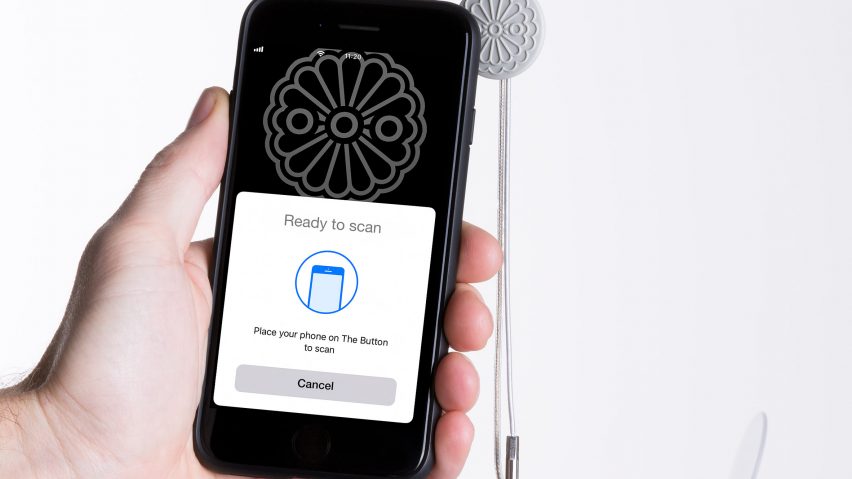Moooi has given each of its products a unique digital identity that customers can access by scanning with a mobile app, to instantly verify the item's authenticity.
Shoppers can download the Moooi app to their mobile phone, and scan a small round button with a floral design that will be attached to all items in Moooi's collection, to determine whether it is a genuine design by the Dutch brand.
Called The Button, the device, which contains a wireless chip, will be rolled out on all Moooi products. The furniture and lighting brand has described it as "a tiny digital superhero that provides Moooi products with an authentic digital identity".
The Button works with near-field communication (NFC) technology, similar to that used in contactless payment. NFC technology enables communication between two electronic devices, one of which is usually a smartphone, over a small distance of four centimetres or less.
When the button is scanned, the app will confirm instantaneously whether the customer is investing in an authentic piece of Moooi design. Moooi instigated the initiative as a way of helping their customers in the face of a growing number of counterfeits or copies.
"Design brands and designers deserve protection to keep creating new products and investing in marketing their designs," said Moooi.
Currently many companies are sticking holograms on their products, and relying on customs control border forces checking these to prevent copies of original designs from entering the market.
According to Moooi, other brands are resorting to using DNA spray on their products that can be tested at customs to prove an item's provenance.
"But all these solutions are only really doable by people working at the border, so you're not protecting average customers," explained Jan Haarhuis, a specialist in customer experience at Moooi, to Dezeen.
"The process of designing, producing and marketing a new authentic design takes time. During that time, it's easy for counterfeiters to copy and reproduce the design and flood the market with cheap imitations," said Moooi.
"Fighting these malpractices often feels futile due to large counterfeit manufacturers and distributors keeping a low profile or countries where counterfeiters aren't prosecuted."
Moooi explained that as brands often launch their products at large international design weeks and trade fairs, it is possible for people to look at soon-to-be released designs and take a number of photographs of them from which to produce copies.
"They're probably walking around in Milan [at the furniture fair], and they see the products," said Haarhuis. He stressed that the knock-offs are often terrible quality.
"It's a real problem that's so bad that we see bad Chinese copies on Alibaba before we do an initial launch. That's how crazy it actually is, and they're done in a really bad way," he continued.
The Button will allow shoppers to purchase Moooi furniture in the knowledge that they're not being tricked into spending money on a fake, and as such "is a personal safe-keeper of investing in authentic design."
In 2016, copyright law was changed in the UK to increase the protection of industrially produced items such as furniture, from 25 years after the piece was first put on the market, to 70 years following the death of the creator, in line with literary and artistic works.

